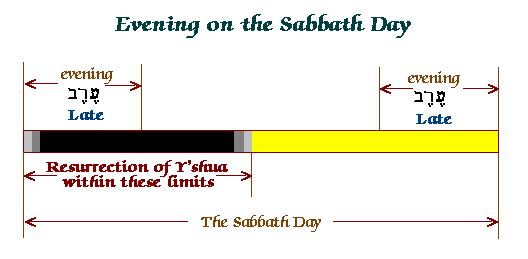|
|
|
|
§256
So the skeptical reader will not doubt the literalness of the translation,
"first of the Sabbaths," we will quote from some of the early translations
of the Bible, made before the King James Version was written.
§257
The Coverdale Quarto Bible, 1537, translated Matthew 28:1 more accurately
than the King James Version. The translators put:
On the evenynge of the Sabbath holy daye, which dawneth the marowe of the first day of the Sabbaths came Mary Magdalene [and] the other Mary to see the sepulchre.§258 Notice the "evenynge of the Sabbath." Hence, the evening of the Sabbath would be Friday night up to midnight or from noon to the end of the Sabbath. The later evening (see below) in the afternoon is the between the evenings evening (when the evening sacrifice was made). The words "which dawneth" point to the first evening, viz. the one beginning the Sabbath. As we have said, the Resurrection was just before dawn on the Sabbath, which was in the morning

But upon one of the Sabbathes (Luke 24:1).§261 This text sounds just like saying "a Sabbath," and in fact the Greek word for "one," like the English "one," can function as the indefinite article "a." Coverdale translates John 20:1 as "on one day of the Sabbath," John 20:19 as "The same Sabbath at even," (This would be the second evening in the afternoon, see Fig. 24) Acts 20:7 as "Upon one of the Sabbaths," and 1 Cor. 16:2 as "some Sabbath daye."
"On a Saboth daye" (Acts 20:7), and "In some saboth daye" (1 Cor. 16:2).§266 Elsewhere, he put the first day of the week. Why? The Greek in the Resurrection passages is the same as in Acts 20:7 and very close to 1 Cor. 16:2. We can only suppose that he allowed tradition to overrule what the texts were really saying.
And ye shall count unto you after the rest, from the day that ye brought the sheaf of the wave offering; seven complete rests shall be; while on the side of the morrow of the seventh rest continue counting fifty days. (rest = sabbath).§272 On the basis of this text many of the Jews enumerated the Sabbaths, as well as the days until Pentecost. Modern Jews count 'weeks' as well as days, but this counting of weeks is actually a counting of the sabbaths that pass since the Passover since 'shabbatot' does not really mean 'weeks.' The other passage (Deut. 16:9) is rather ambiguous, and can mean 'seven sevens,' or even 'seven sevenths,' as well as a 'period of seven days.'
Mark 16:9, "Jesus aber, da er aufserstanden mar fruhe am ersten Tage der Sabbather ..."
Luke 24:1, "Aber an der Sabbather einem sehr fruhe, ..."
John 20:1, "An der Sabbather einem ..."
John 20:19, "Am Abend aber desfelben Sabbaths, ..."
Acts 20:7, "Auf einem Sabbath aber, ..."
I Cor. 16:2, "Auf einen jeglichen Sabbather ...."
(Das Neue Testament unsers Herrn und Heilandes Jesu Christi nach der deutschen Uberse Bung[?] Dr. Martin Luthers - Coln, gedrudt[?] fur die britische und ausland ische Bibelgesellschaft, 1885).
legacy name: www.parsimony.org